
Blank verse is poetry written with regular metrical but unrhymed lines, almost always in iambic pentameter. It has been described as "probably the most common and influential form that English poetry has taken since the 16th century", and Paul Fussell has estimated that "about three quarters of all English poetry is in blank verse".

"Annabel Lee" is the last complete poem composed by American author Edgar Allan Poe. Like many of Poe's poems, it explores the theme of the death of a beautiful woman. The narrator, who fell in love with Annabel Lee when they were young, has a love for her so strong that even angels are envious. He retains his love for her after her death. There has been debate over who, if anyone, was the inspiration for "Annabel Lee". Though many women have been suggested, Poe's wife Virginia Eliza Clemm Poe is one of the more credible candidates. Written in 1849, it was not published until shortly after Poe's death that same year.

"Tam o' Shanter" is a narrative poem written by the Scottish poet Robert Burns in 1790, while living in Dumfries. First published in 1791, at 228 lines it is one of Burns' longer poems, and employs a mixture of Scots and English.
Sonnet 29 is one of 154 sonnets written by the English playwright and poet William Shakespeare. It is part of the Fair Youth sequence. In the sonnet, the speaker bemoans his status as an outcast and failure but feels better upon thinking of his beloved. Sonnet 29 is written in the typical Shakespearean sonnet form, having 14 lines of iambic pentameter ending in a rhymed couplet.
The Burns stanza is a verse form named after the Scottish poet Robert Burns, who used it in some fifty poems. It was not, however, invented by Burns, and prior to his use of it was known as the standard Habbie, after the piper Habbie Simpson (1550–1620). It is also sometimes known as the Scottish stanza or six-line stave. It is found in Middle English in the Romance of Octovian (Octavian). It was also found in mediaeval Provençal poems and miracle plays from the Middle Ages.

Poems, Chiefly in the Scottish Dialect, commonly known as the Kilmarnock Edition, is a collection of poetry by the Scottish poet Robert Burns, first printed and issued by John Wilson of Kilmarnock on 31 July 1786. It was the first published edition of Burns' work. It cost three shillings and 612 copies were printed. The volume was dedicated to Gavin Hamilton.
This article lists all known poems by American author and critic Edgar Allan Poe, listed alphabetically with the date of their authorship in parentheses.
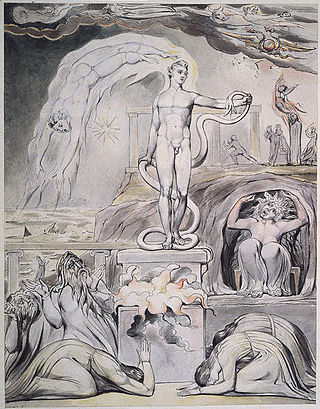
On the Morning of Christ's Nativity is a nativity ode written by John Milton in 1629 and published in his Poems of Mr. John Milton (1645). The poem describes Christ's Incarnation and his overthrow of earthly and pagan powers. The poem also connects the Incarnation with Christ's Crucifixion.

Blood and the Moon is a poem by Irish poet William Butler Yeats written in 1928 and published in the collection The Winding Stair in 1929 before being reprinted in The Winding Stair and Other Poems in 1933. Yeats composed the poem in response to the 1927 assassination of Kevin O'Higgins, the Vice-President of the Free State, whom Yeats had known personally. The poem contains many themes common in Yeats's poems from the 1920s including the "tower", a reference to Thoor Ballylee, which had been the title of a collection of works printed the year before "Blood and the Moon" was published, as well as the "gyre" which had been a major focus of his 1920 poem "The Second Coming".

Poems, Chiefly in the Scottish Dialect is commonly known as the first Edinburgh Edition and the partial second setting has become known as the Stinking Edition. It is a collection of poetry and songs by Robert Burns, first Printed for the Author by William Smellie in Edinburgh and published or Sold by William Creech of Edinburgh on the 17 April, an announcement being made in the Edinburgh Advertiser on that date, although the date 21 April 1786 is given by a few authors. The Kilmarnock Edition made Robert Burns Caledonia's Bard whilst the 'Edinburgh Edition' elevated him into a position amongst the world's greatest poets.
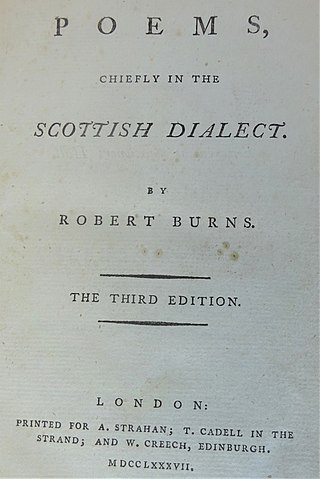
Poems, Chiefly in the Scottish Dialect is commonly known as the Third or London Edition and sometimes the Stinking Edition. It is a collection of poetry and songs by Robert Burns, printed for A. Strahan; T. Cadell in the Strand; and W. Creech, Edinburgh. MDCCLXXXVII The date of publication for the London Edition was in November 1787, however Strahan and Cadell had previously advertised for sale the 'Second' or 'Edinburgh Edition' using the 500 or so copies that William Creech still had that were unsold. The successful selling of these made a truly new 'London Edition' a commercially viable enterprise.

The Cotter's Saturday Night is a poem by Robert Burns that was first published in Poems, Chiefly in the Scottish Dialect in 1786.

Poems, Chiefly in the Scottish Dialect was issued during the poet's lifetime In Two Volumes. The Second Edition Considerably Enlarged. It is a collection of poetry and songs by the poet Robert Burns, printed for T. Cadell, London, and W. Creech, Edinburgh. M,DCC,XCIII The date of publication for this edition was 16 February 1793 as advertised in the Edinburgh Courant. The successful demand for the 1787 Edinburgh Edition seems to have encouraged Creech to publish this new edition as the 1787 volume had been sold out since around 1791.

Robert Burns's Commonplace Book 1783–1785 is the first of three commonplace books that were produced by the poet. The contents cover drafts of songs and poems, observations, ideas, epitaphs, etc.
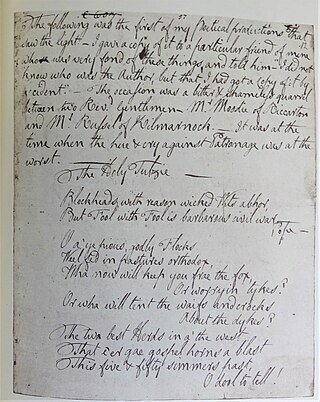
'The Holy Tulzie', 'The Twa Herds' or 'An Unco Mournfu' Tale was a poem written in 1784 by Robert Burns whilst living at Mossgiel, Mauchline, about a strong disagreement, not on doctrine, but on the parish boundaries, between two 'Auld Licht' ministers, John Russel and Alexander Moodie It was followed by "The Holy Fair", "The Ordination", "The Kirk's Alarm", "Holy Willie's Prayer", etc.
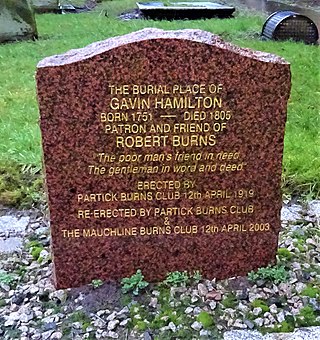
Gavin Hamilton was one of Robert Burns's closest friends and a patron. The first 'Kilmarnock Edition' of his poems were dedicated to Gavin Hamilton.

The surviving manuscript of the instructional work A Manual of Religious Belief is written in the form of a theological dialogue between father and child written out in holograph by John Murdoch for William Burnes, Robert Burns's father. William had started to compose and compile the work before Robert Burns's birth and wrote the first rough draft that has not survived. This work was originally composed with a stronger Scots language content that Murdoch modified, as well as making grammatical corrections.
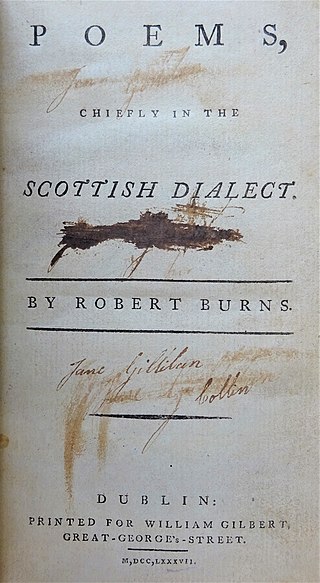
Poems, Chiefly in the Scottish Dialect was the second 'pirated' issue of Robert Burns's work, being published in Ireland at Belfast without permission from or payment to the author or publisher. It is a so-called 'Stinking Edition', carrying the error 'Stinking' for the Scots word 'Skinking' (watery) in the poem "To a Haggis" because the type setters copied from a 1787 'Stinking Edition' of Poems, Chiefly in the Scottish Dialect . It has been shown to be from the same print setting as the 'Belfast Edition' but with a different title page.

Poems, Chiefly in the Scottish Dialect was a 'pirated' edition of Robert Burns's work, being published in Ireland without permission from or payment to the author or publisher. It is a so-called 'Stinking Edition', carrying the error 'Stinking' for the Scots word 'Skinking' (watery) in the poem "To a Haggis" because the type setters copied from a 1787 'Stinking Edition' of Poems, Chiefly in the Scottish Dialect .
"Man was made to Mourn: A Dirge" is a dirge of eleven stanzas by the Scots poet Robert Burns, first published in 1784 and included in the first edition of Poems, Chiefly in the Scottish Dialect in 1786. The poem is one of Burns's many early works that criticize class inequalities. It has become known for its line protesting "Man's inhumanity to man", which has been widely quoted since its publication.
















